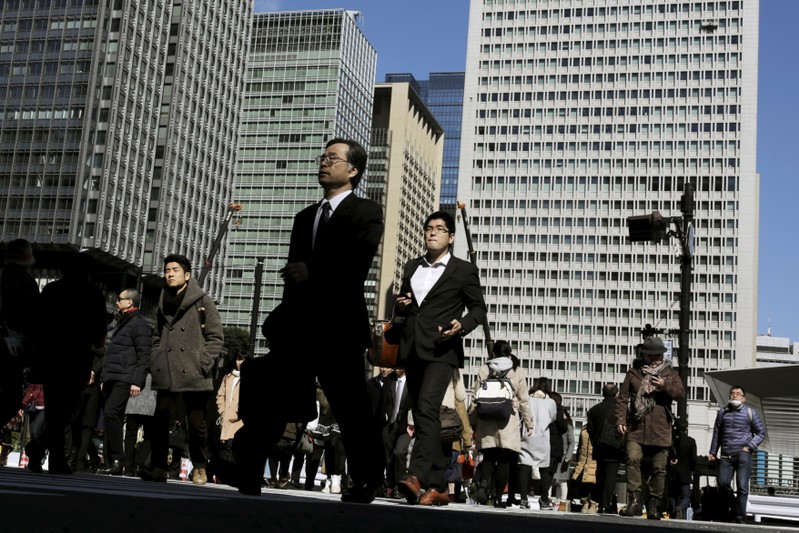
FILE PHOTO: People cross a street in a business district in Tokyo, Japan, February 16, 2016. REUTERS/Thomas Peter
December 13, 2018
TOKYO (Reuters) – Japan is having its second-best stretch of uninterrupted post-war growth, the government said on Thursday, a nod to premier Shinzo Abe’s aggressive stimulus measures deployed five years earlier to pull the economy out of prolonged stagnation.
But the confirmation comes at a time when Sino-U.S. trade frictions, slowing global demand and volatile markets cloud the outlook for the export-reliant economy.
A government panel has determined that Japan’s current economic expansion began in December 2012 and as of September 2017, became the second-longest uninterrupted period of growth since World War Two.
If the expansionary phase is sustained until January 2019, the economy would mark the longest post-war expansion of 74 months.
Many analysts, however, warn of a darkening outlook for the world’s third-largest economy, as overseas headwinds build up.
“The economy is expected to continue to expand, though the pace is slowing, till January next year,” said Hiroaki Mutou, chief economist at Tokai Tokyo Research Institute.
“But uncertainty over the economic outlook has not been dispeled…no economic data suggests that the economic growth will accelerate.”
Japan’s government defines whether the economy is expanding or in recession mainly by looking at the coincident index, which includes a range of data such as factory output, employment and retail sales.
A government panel consisting of academics and economists then scrutinizes more data and makes a final call, retrospectively, on when the economic cycle began or ended. The government’s definition of a recession thus differs from the one widely known in markets, which is two straight quarters of economic contraction.
Already, there are signs economic growth could be peaking.
Japan’s index of coincident economic indicators worsened in September and the government cut its view for the first time in more than three years, suggesting growth is at a standstill.
The government cut its assessment of the coincident index <JPCIIN=ECI> for the first time since May 2015, saying it is stalling. It previously viewed that the index was showing an improvement.
(Reporting by Kaori Kaneko, Writing by Leika Kihara; Editing by Jacqueline Wong)

